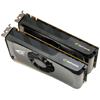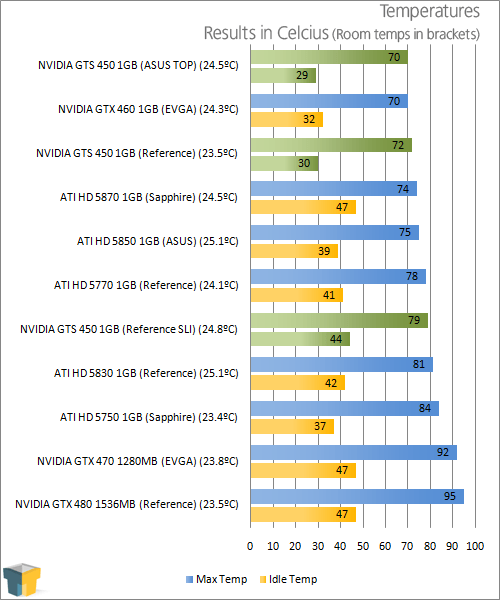- Qualcomm Launches Snapdragon 4 Gen 2 Mobile Platform
- AMD Launches Ryzen PRO 7000 Series Mobile & Desktop Platform
- Intel Launches Sleek Single-Slot Arc Pro A60 Workstation Graphics Card
- NVIDIA Announces Latest Ada Lovelace Additions: GeForce RTX 4060 Ti & RTX 4060
- Maxon Redshift With AMD Radeon GPU Rendering Support Now Available
NVIDIA GeForce GTS 450 – The Super-Affordable Fermi

Been itching to buy a piece of NVIDIA’s Fermi architecture, but were looking for a total sweet spot? At $130, the GeForce GTS 450 might be it. In all of our tests, it competed nicely with AMD’s Radeon HD 5750, but most impressive might be the card’s scaling ability in SLI, which can be summed up in one word… awesome.
Page 10 – Power & Temperatures
To test our graphics cards for both temperatures and power consumption, we utilize OCCT for the stress-testing, GPU-Z for the temperature monitoring, and a Kill-a-Watt for power monitoring. The Kill-a-Watt is plugged into its own socket, with only the PC connect to it.
As per our guidelines when benchmarking with Windows, when the room temperature is stable (and reasonable), the test machine is boot up and left to sit at the desktop until things are completely idle. Because we are running such a highly optimized PC, this normally takes one or two minutes. Once things are good to go, the idle wattage is noted, GPU-Z is started up to begin monitoring card temperatures, and OCCT is set up to begin stress-testing.
To push the cards we test to their absolute limit, we use OCCT in full-screen 2560×1600 mode, and allow it to run for 15 minutes, which includes a one minute lull at the start, and a four minute lull at the end. After about 5 minutes, we begin to monitor our Kill-a-Watt to record the max wattage.


The reference cooler seen on the GTS 450 didn’t look quite so efficient to look at, but it clearly does its job well, ranking very well in our charts. ASUS’ DirectCU cooler improves on things even further, though the actual differences aren’t quite as stark as I would have imagined.
On the power side of things, efficiency isn’t something the GF100 series thrives at, but things aren’t too bad here, with the GTS 450 sucking down 24W above the HD 5750 at load.
Support our efforts! With ad revenue at an all-time low for written websites, we're relying more than ever on reader support to help us continue putting so much effort into this type of content. You can support us by becoming a Patron, or by using our Amazon shopping affiliate links listed through our articles. Thanks for your support!





